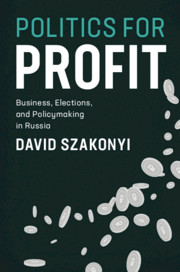Book contents
- Frontmatter
- Dedication
- Contents
- List of Figures
- List of Tables
- Acknowledgments
- Introduction
- 1 A Theory of Businessperson Candidacy
- 2 Identifying Businesspeople Who Run for Office
- 3 Economic Competition, Weak Parties, and Businessperson Candidacy
- 4 Choosing Ballots, Parties, and Delegates
- 5 Firm-Level Returns from Businessperson Candidacy
- 6 Businesspeople as Policymakers
- 7 Conclusion and Policy Recommendations
- Appendix
- Bibliography
- Index
- Series Page
5 - Firm-Level Returns from Businessperson Candidacy
Published online by Cambridge University Press: 15 June 2020
- Frontmatter
- Dedication
- Contents
- List of Figures
- List of Tables
- Acknowledgments
- Introduction
- 1 A Theory of Businessperson Candidacy
- 2 Identifying Businesspeople Who Run for Office
- 3 Economic Competition, Weak Parties, and Businessperson Candidacy
- 4 Choosing Ballots, Parties, and Delegates
- 5 Firm-Level Returns from Businessperson Candidacy
- 6 Businesspeople as Policymakers
- 7 Conclusion and Policy Recommendations
- Appendix
- Bibliography
- Index
- Series Page
Summary
Do firms with directors holding elected political office benefit from political connections? Restricting the analysis to elections in single-member districts, this chapter uses a regression discontinuity design to identify the causal effect of gaining political ties, comparing outcomes of firms that are directed by candidates who either won or lost close elections to regional legislatures. Having a connection to a winning politician increases a firm’s revenue by 60 percent and profitability by 15 percent over a term in office. The chapter then tests between different mechanisms, finding that connected firms improve their performance by gaining access to bureaucrats, and not by signaling legitimacy to financiers. The value of winning a seat increases in more politically competitive regions, but falls markedly when more businesspeople win office in a convocation. Politically connected firms extract fewer benefits when faced with greater competition from other rent-seekers.
Keywords
- Type
- Chapter
- Information
- Politics for ProfitBusiness, Elections, and Policymaking in Russia, pp. 180 - 209Publisher: Cambridge University PressPrint publication year: 2020

